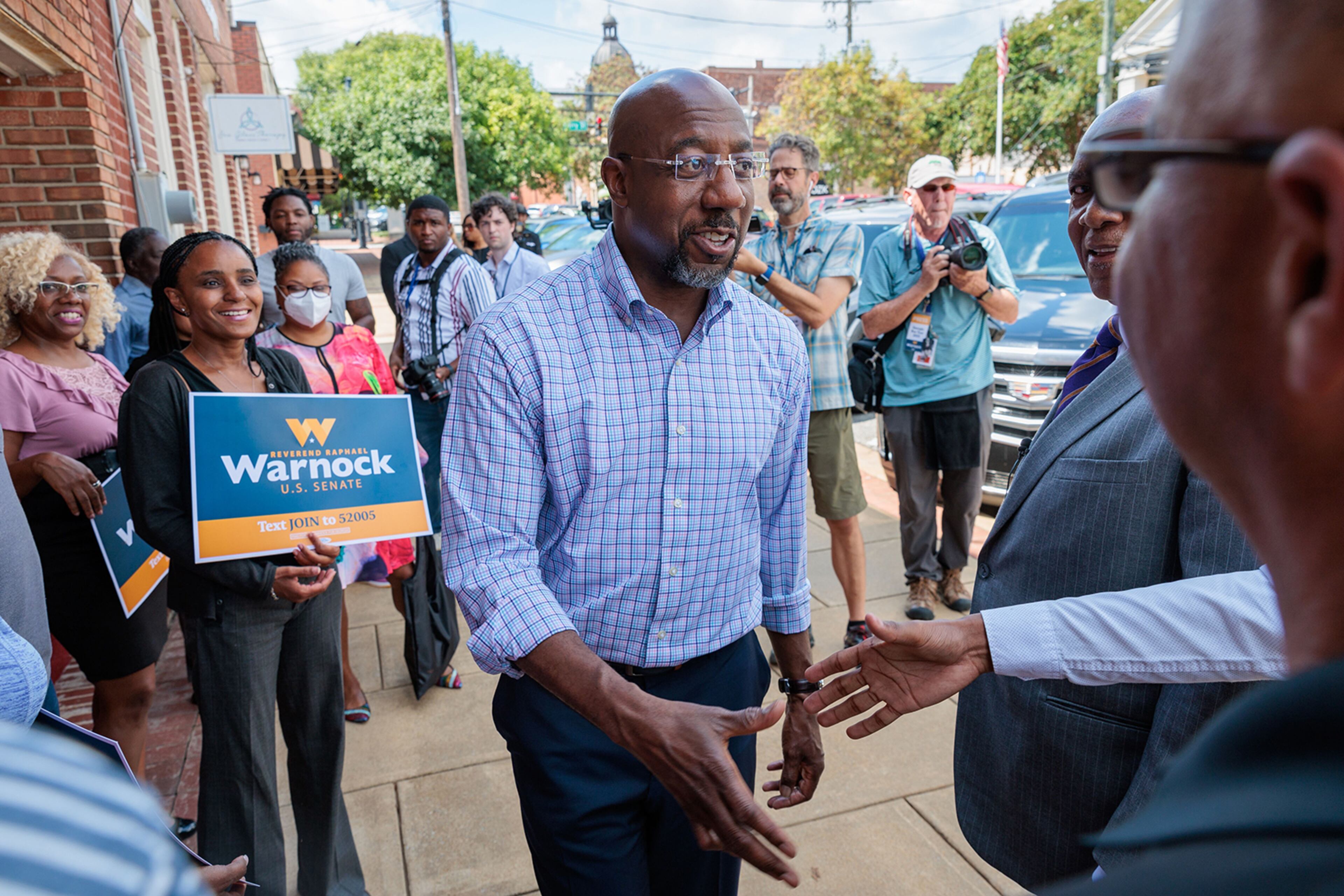Two Georgia Republican candidates, two different views on economy

U.S. Senate hopeful Herschel Walker paints a bleak picture of the economy: soaring inflation, high taxes and wasteful government spending. But listen to Gov. Brian Kemp and a far different image emerges, one where jobs are being created and investment is flourishing.
It’s routine for candidates from competing parties to have divergent views on big issues. But Walker and Kemp are both Republicans at the top of the ticket in Georgia. The sharp divide is unusual and underscores how tricky it has been for the GOP to run on the wobbly economy this election cycle.
Polls show the economy is top of mind for most voters heading into the midterm elections, and how candidates frame pocketbook issues could prove critical at the ballot box.
But there are some signs the economy may be rebounding with gas prices on the decline. Still, inflation remains a stubborn issue and some economists warn a recession is imminent.
Walker’s strategy is straightforward. An outsider looking to oust an incumbent, he blames U.S. Sen. Raphael Warnock, President Joe Biden and Democratic-controlled Washington for the stubborn inflation that has forced consumers to pay more for groceries, household products and other things they need.
“Fuel costs are still high. Grocery costs are still high. My utility bill has gone up, and so inflation is still up and everyone knows that,” Walker said Friday at a campaign event in Gwinnett County. “And it’s because of Sen. Warnock. You know that. And President Biden.”

Economists cite multiple causes for inflation, including soaring energy and fuel prices, disruptions in the global supply chain and federal pandemic aid. And while inflation has hit the United States hard, the rates are even higher in other developed nations.
Kemp must tread more carefully in his rematch against Stacey Abrams. A key part of the Republican’s reelection campaign is his fiscal stewardship of the state through the turbulence of the COVID-19 pandemic and inflation that’s reached heights not seen in roughly four decades.
He’s trying to tout his administration’s fiscal policies while shifting responsibility for higher prices to Biden’s administration. On the campaign trail, he blasts “Biden-Abrams” inflation and said he has little power to “fix all the broken problems coming out of Washington” but can help with more limited initiatives.
“That’s what we’re working to help you fight through,” he said. “It’s why we suspended the gas tax and why I’m going to work with the members of the General Assembly to see what else we can do to help Georgians fight through this tough time.”
Who’s right?
Unlike Walker, Kemp has a record to promote.
Two massive auto plants that plan to pump out thousands of electric vehicles were lured with the promise of a talented workforce, sophisticated logistics and huge packages of incentives.
And the state has amassed record state budget surpluses — fueled by federal spending and boosted taxes collected on higher wages and prices of goods. Kemp opposes calls by Abrams to use this year’s surplus to finance a slate of programs she said would help lift Georgians out of poverty. Kemp said those “generational promises” would be too costly in the long run.
He’s also regularly announcing new ways to spend billions of federal funding adopted by the Democratic-controlled Congress over the objections of Kemp and other Republicans.
Democrats, meanwhile, have said that the major pieces of federal legislation boosting spending on infrastructure and climate initiatives will help rein in rising costs while at the same time shifting jobs to growing sectors such as the green industry.

So, moving past the political posturing, who is actually right?
Both could be.
Tom Smith, an economist and professor at Emory University’s Goizueta School of Business, said it is common to cherry-pick statistics and data to make your case, especially in an economy like this one, which is sending mixed messages.
At the same time he said, you can only push the narrative so far.
“When the (University of Georgia) Bulldogs lose, you can talk about what a great game they played, but they still lost,” he said.
“Georgia’s economy is strong, but it has some issues,” he said. He listed Atlanta’s lack of affordable housing and recent reports that found the Atlanta area had among the highest inflation rates in the country.
“An economy is a complex machine,” he said. “You can’t point to just one metric.”
‘Really struggling’
Michael Toma, an economist and professor at Georgia Southern University, said it is also difficult to disentangle state and federal economies. The port in Savannah, for instance, is a huge driver of Georgia’s economic growth, but its expansion has also been funded by millions of dollars in federal money.
Still, he said, the federal government has far more sway over macro trends, such as inflation.
“And that’s the part of the economy people interact with more frequently,” Toma said. “It’s an important part of the equation, but it’s a lot more complicated than that.”
But facts don’t always dictate how voters feel about an issue. That, like so many other things, can be influenced by political persuasion.
At a Walker rally last week at a sports complex in Bartow County, Jimmy Moore, 81, bemoaned the high costs “on just about everything” and blamed spending by Democrats in Washington. He said it’s nearly impossible to leave his local Ingles grocery store without spending $100 these days.
“People are really struggling,’ he said.
But Democrats seemed more upbeat, willing to give national policies more time to take hold. At a Warnock rally in Cobb County, Janice Cooper of Marietta pleaded for patience.
“You do see some prices coming down. My son has a restaurant, and he says things are a little better,” Cooper said. “I’m optimistic on the economy.”





